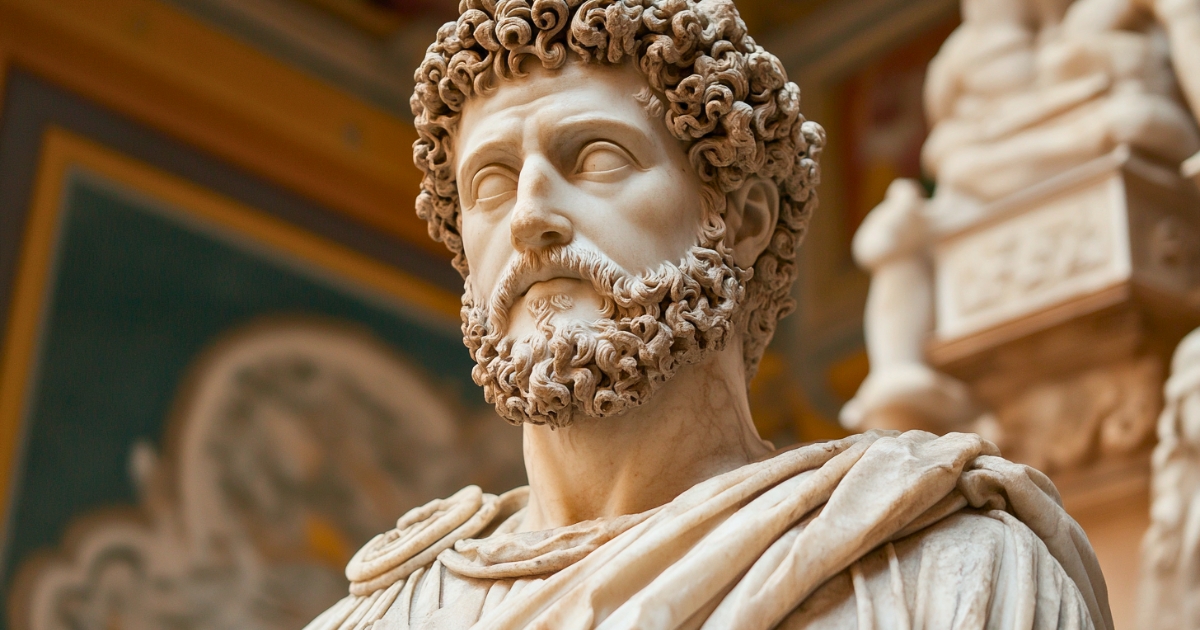Introduction
Marcus Aurelius, who ruled the Roman Empire in the 2nd century, is known as the “Philosopher Emperor.” He was the last of the Five Good Emperors and a devoted follower of Stoic philosophy. This article will explore Marcus Aurelius’s life, thoughts, and governance, as well as consider his influence on later generations.
Early Life and Education
Marcus Aurelius was born on April 26, 121 AD, into a noble Roman family. From an early age, he received an excellent education, studying philosophy, rhetoric, and law. He was particularly drawn to Stoic philosophy, which greatly influenced his later reign as emperor and shaped his thoughts.
Path to the Throne
In 138 AD, he was adopted by the then-Emperor Hadrian. At the same time, Antoninus Pius was also adopted, with Hadrian designating Antoninus Pius as his immediate successor and Marcus Aurelius as the next in line. In 161 AD, following the death of Antoninus Pius, Marcus Aurelius ascended to the throne as co-emperor alongside his adoptive brother, Lucius Verus.
Marcus Aurelius as a Ruler
As the last of the Five Good Emperors, Marcus Aurelius strived for the stability and prosperity of the empire. However, his reign was far from peaceful. He faced numerous challenges, including the Parthian War in the East, the prolonged conflict with Germanic tribes known as the Marcomannic Wars, and the outbreak of the Antonine Plague.
In response to these crises, Marcus Aurelius demonstrated calm and decisive leadership. He not only pursued military solutions but also sought diplomatic resolutions to protect the empire’s security. Additionally, he worked on improving public health measures to combat the plague.
As a legal scholar, Marcus Aurelius also focused on refining the legal system. He enacted laws to protect the rights of slaves and show consideration for the vulnerable, aiming to create a more equitable society.
Stoic Philosophy and “Meditations”
The core of Marcus Aurelius’s philosophy is recorded in his book “Meditations.” This work, believed to have been written during the harsh conditions of the Marcomannic Wars, frankly expresses his inner conflicts and philosophical reflections.
“Meditations” strongly reflects the teachings of Stoic philosophy. Its central ideas include:
- Emphasis on reason: He taught that the universe has an order, and it is important to understand and accept it.
- Pursuit of virtue: He believed that acquiring virtues such as justice, courage, temperance, and wisdom was the purpose of life.
- Indifference: He emphasized the importance of maintaining inner calm without being swayed by external events.
- Fulfillment of duty: He stressed the importance of fulfilling one’s responsibilities as a member of society.
These ideas greatly influenced Marcus Aurelius’s governance. He portrayed the ideal ruler as a person who is rational, virtuous, and impartial.
The Marcomannic Wars
The latter half of Marcus Aurelius’s reign was consumed by the prolonged conflict with Germanic tribes known as the Marcomannic Wars. This war, which lasted intermittently from 166 to 180 AD, saw Germanic tribes such as the Marcomanni and Quadi cross the Danube River and invade the Roman Empire, posing a significant threat.
The emperor himself went to the front lines to command the army. This prolonged conflict occupied much of Marcus Aurelius’s life. Even on the battlefield, he continued to write “Meditations,” balancing his roles as a philosopher and a ruler.
Ultimately, the Roman army succeeded in repelling the Germanic tribes, but this conflict also demonstrated the limits of the Roman Empire’s power.
The Antonine Plague
During Marcus Aurelius’s reign, a major epidemic known as the Antonine Plague broke out. This plague, believed to have been either smallpox or measles, is thought to have significantly reduced the population of the Roman Empire. The outbreak of the plague had a major impact on the empire’s economy and military strength, making Marcus Aurelius’s rule even more challenging.
The Succession Issue
Marcus Aurelius named his biological son, Commodus, as his successor. However, Commodus became known as a tyrant, bringing an end to the era of the Five Good Emperors. This is sometimes viewed as a negative aspect of Marcus Aurelius’s reign, perhaps exemplifying the conflict between his philosophical ideals and practical political decisions.
Influence on Later Generations
Marcus Aurelius’s philosophy and governance have had a significant impact on later generations. “Meditations” has been highly regarded even by Christian thinkers and has been widely read by intellectuals since the Renaissance.
His approach as a ruler has influenced later monarchs and politicians as an ideal model of leadership. His principles of impartiality, rational judgment, and emphasis on virtue resonate with modern leadership theories.
Moreover, Marcus Aurelius’s philosophy has influenced modern self-help and psychotherapy. In particular, the idea of maintaining inner calm without being affected by external events is being reevaluated in today’s stress-filled society.
Conclusion
Marcus Aurelius was a rare figure who was both a philosopher and a ruler. His thoughts and governance, based on Stoic philosophy, guided the Roman Empire through difficult times. The ideas recorded in “Meditations” continue to influence many people across generations.
The image of Marcus Aurelius, who struggled between ideals and reality but stayed true to his beliefs, offers many insights to us living in the modern era. His philosophy and way of life continue to provide important guidance in considering how to relate to oneself and society in our increasingly complex modern world. At the same time, as seen in the succession issue, he also shows us the human figure torn between ideals and reality. In this respect, Marcus Aurelius’s life may teach us about the difficulty of balancing power and philosophy.


